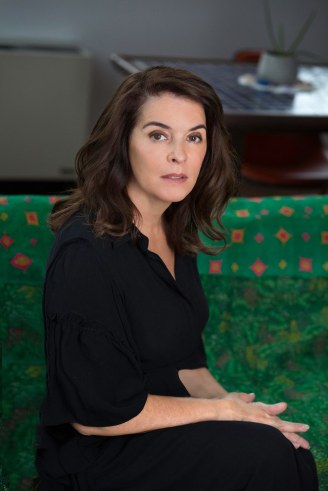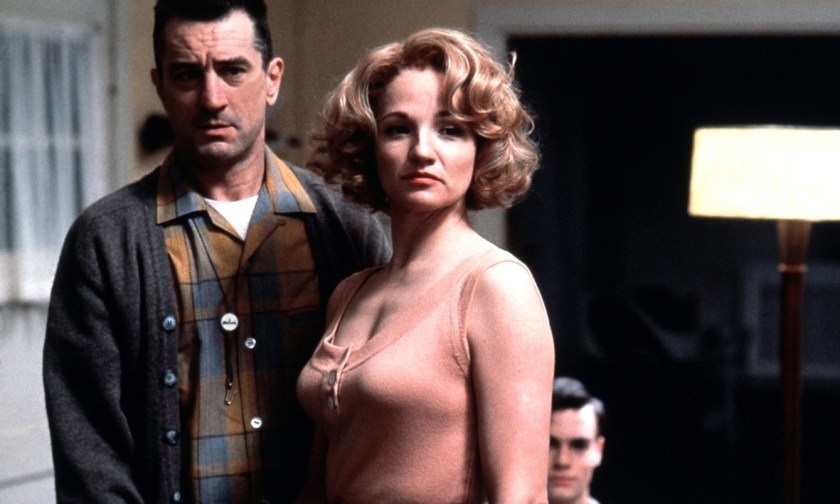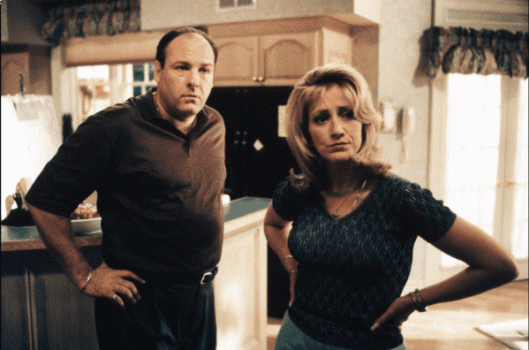I never planned to write about the spreading shit stain that goes by the name of Harvey Weinstein. This is a Sopranos blog, not a personal or topical one, but when I read Ronan Farrow’s piece on Weinstein in the New Yorker the night it was published, I felt compelled to comment.
Many names have been printed alongside Weinstein’s in headlines, attached to stories that follow an eerily similar pattern of coercion and force. On October 27, 2017, Annabella Sciorra and Ellen Barkin were two such names. The Sopranos connection in Annabella is obvious. Ellen is someone I admire for being as direct and uncompromising as the characters she plays on-screen.

Sciorra had previously denied having any issue with Weinstein, dismissing allegations by saying that she must not be his “type.” Seven months later, she contacted Farrow again. This time, she was clear: Harvey Weinstein had raped her. She described in horrific detail how Weinstein forced his way into her apartment and had sex with her. When it was over, she did not go to the police.
Ellen Barkin told Farrow that she was the target of Weinstein’s verbal abuse on the set of 1992’s Into the West, which he produced. Not content with calling her a “cunt,” Weinstein called her a “cunt bitch.” This sexually violent language does not inflict any physical harm but is no less damaging.
These stories are not the first of their kind. Such accounts make you wonder how one person can be so powerful that they believe they are above reproach — and be correct. Weinstein’s actions have been an open secret in Hollywood for over a decade. Numerous unnamed publicists and agents have suppressed the knowledge for fear of toppling Weinstein’s empire and losing money and face. “This fear of losing your career is not losing your ticket to a borrowed dress and earrings someone paid you to wear,” stresses Barkin. “It’s losing your ability to support yourself, to support your family, and this is fucking real whether you are the biggest movie star or the lowest-pay-grade assistant.”
So often we venerate celebrities, bestowing upon them a kind of mythical status that we believe protects them from the slings and arrows of everyday life. We forget that acting is, foremost, a job. It is a career; it pays the bills and keeps a roof overhead. Barkin reminds us that fame is not a barrier against physical pain or psychological ruin. Abuse recognizes no status. Trauma doesn’t care if you are waved through a film studio’s gates in a limo each day, or have a gleaming statue on your mantel. It doesn’t matter if you’re an A-Lister or an A-Lister’s assistant.

That’s why it hurts to know that fame is what has protected Weinstein for so long. He was powerful. He had money and clout. The hunger for prestige and recognition, for financial security, has driven people into complicit silence. Those who were aware of what was going on held back information that could have stopped him earlier. Quentin Tarantino admitted that he knew, but did not act. Weinstein’s company, Miramax, produced twelve of his films, including Pulp Fiction and Jackie Brown. To expose Weinstein would be to forfeit his own growing career. So, he said nothing and continued to profit.
But why didn’t the others…?
Victim blaming is one of the chief reasons why sexual abuse and assault victims do not come forward. Women (and men) choose silence over ridicule and scrutiny. They decide that losing countless nights of sleep to PTSD-fuelled nightmares is better than losing their job or losing time/money to a trial that won’t end in their favour.
Too often, they are threatened by the assailant with further abuse or harassment if they report the incident. Weinstein engaged in this tactic when he and his associates called women he knew to find out who had informed the press. That’s right, he called women that he had allegedly (I have to throw that word in there so he doesn’t call me, too) attacked and told them not to squeal. How did that sick conversation go?
For actors and other public figures, these risks are amplified. Their names are splashed across magazine covers and linked to on gossip sites. Comment sections turn into free-for-alls teeming with sexist, racist, and personal attacks. “Inside stories” are “revealed” to news outlets by those who claim to have had a negative experience with so-and-so, who must now not be trusted because they make their assistants jump the line in Starbucks. (These anonymous discreditors probably also saw Goody Osbourne with the Devil!) Sympathy for the accused is common.

Actors are made to feel as if they should just accept this behaviour as a pitfall of their chosen profession. The emphasis is on choice, a word that implies awareness and tacit consent. It tells them that they should have known what they were getting into when they entered a sexually-charged industry that places a premium on youth and beauty.
It can be hard for those who have been abused to avoid this line thinking when there exists the notion that appearance and behaviour correlate with harassment. Regardless of status, women are routinely told that if unwanted attention is paid us, then we should have been more careful in the first place. We should’ve lowered our hemline, stopped after the third drink, or assessed the situation better to protect ourselves against the uncontrollable urges of the men in our midst. We are warned against being “that kind of woman.”
This is likely part of why Sciorra initially told Farrow that Weinstein ignored her because she was not “his type.” Her casual brush-off was a way of protecting herself against this kind of erroneous judgment. Her feigned ignorance about the motivations of sexual assault (the need for power, not overwhelming lust caused by physical appearance) was a conditioned response, one so deeply ingrained that even she believed it for a time. After the attack, Sciorra asked herself why she opened her apartment door to Weinstein in the first place. She absorbed the blame, turning it inward, where it manifested itself as depression. “I felt like I had fucked up,” she said of that night.
Which all brings me to another layer of misogyny: Women who go public with their abuse are often swiftly ostracized. They are labelled “difficult,” which is a polite way of saying “bitchy.” The vague but damning term is rarely applied to men and is not easily shed. It hangs around their necks like an invisible albatross and has very real, visible effects.
From 1992-1995, Sciorra says she was out of work. A quick wikipedia search reveals that she made seven movies in that time period. However, they were all declared unanimous flops, despite having strong casts that paired her with Hollywood heavyweights like Alan Alda and Jill Clayburgh. Her career should have flourished after the success of The Hand That Rocks The Cradle (produced by David Madden and Ferdinand Abardo, not Weinstein), but she suddenly found it difficult to land parts. Sciorra believes that “the Harvey machine” was behind the decline. Word circulated that she was “difficult,” whatever that meant, and she became a professional liability. Directors, do not interact.
As early as 1992, Barkin herself had gained a reputation for being the d-word. “The more powerful you become, some people especially don’t like it that you’re a woman,” she told Movieline’s Stephen Rebello, in an interview archived for our benefit on LeBeau’s Le Blog, a fuckin’ fantastique site. (Be sure to read the full thing. It’s a two-pager.) “I stick up for myself. They don’t mind if a man doesn’t play the game, but if you’re a woman, people say, ‘Who the fuck is she?’”
Her assessment is correct. Generally, only women are “difficult”; men are “dedicated.” Al Pacino and Robert De Niro are never called divas. They’re hailed as artists, masters of method acting, whose demands on a director are merely signs of their commitment to a role. Questions? Ask a hundred of them! You’re Al Pacino! Ask them loudly! HOO HAH! Ask a few as a woman? Everyone watch out for ‘Mad Dog Barkin.’ She’s a bitch.

If you look at the time period that these stories come from, they all occur in a cluster. Weinstein was on a tear in the early 90s. He has been known for his temper and aggression. You don’t have to stretch your imagination far to believe Sciorra and Barkin’s stories.
I don’t want to trivialize these experiences by tying them too closely to fictional plots, but I will admit, they brought to mind Melfi’s conflict of conscience in “Employee of the Month.” Tackling tough topics in a realistic manner has always been The Sopranos’ strength. Characters and storylines do not always follow a straight path to a tidy resolution. They often want for closure, as they would in real life. The lingering cruelty of these situations, fictional or otherwise, is that the accuser suffers while their attacker prospers. The women are delegitimized, while their rapist receives public accolades.
Sciorra kept the attack a secret for over twenty years. Even when opportunities to tell her story arose, she balked, fearing personal and professional repercussions. Melfi wrestles with the option of siccing Tony on the son-of-a-bitch from the parking garage before deciding to keep it to herself. In one of the most powerful scenes ever shown on TV, she alters the course of countless lives (her own, Tony’s, Rossi’s, and the public) with one word: “No.” She does so with the awareness that invoking Tony’s powers would lead to her professional downfall if ever discovered, as well as her own personal decline.
Released on a technicality, Rossi is free to return to his job, where he was a model employee. He may re-offend, or he may not. He could go on to live a normal life, maybe even manage his own Wrap Nation in the future.
Right now, Weinstein’s carefully constructed reality is being rended by the allegations. Honours such as the Order of the British Empire and Legion of Honour, awarded in 2004 and 2012 respectively, have been revoked. The Producers Guild of America imposed a lifetime ban on his membership. Organizations are cutting their ties, while actors like Channing Tatum and director Rein Carolin quit their scheduled projects with him. His brother, Bob Weinstein, fired him from The Weinstein Company, which they founded together in 2005.
In the two weeks since I began working on this post (I was delightfully sidetracked by a trip to Cleveland), the Weinstein revelations have sparked a flood of related accusations. The roster of the repulsive has grown to include Kevin Spacey, Dustin Hoffman, Louis C.K., George Takei, and Richard Dreyfuss, to name only a few. Even Jann Wenner, Rolling Stone’s co-founder and a Rock and Roll Hall of Famer, is now on the list of men who have abused their power. The separate stories take a familiar shape and are frightening in their clarity.
[Ed. note, 2018: Scott Brunton, Takei’s accuser, was himself accused of “walking back” his story after inconsistencies in his accounts raised questions. Brunton also reportedly used his account of the alleged assault as a party piece and claimed that he was not scarred by the event. This can be looked at as part of the broader discussions around the way people respond to trauma, as well as our reaction to and interpretation of their response.
Takei took to Twitter twice, first to defend himself, then to extend best wishes and peace to Brunton after the supposed retraction. Whatever conclusion you come to, there’s still the troubling clip of Takei telling Howard Stern that he “persuaded” sexually skittish men by groping them. He has since expressed regret for the remark, explaining that his comments were part of his “naughty gay grandpa persona.”]
Though it all seems like a recurring nightmare, something feels different this time. Public reaction has changed. I’ve seen a lot of support for these women. There seems to be less doubt about the veracity of their stories. Men are coming out with their own stories about Weinstein and others like him. Netflix ousted Spacey from House of Cards and cancelled his 2018 biopic of Gore Vidal. Ridley Scott is re-shooting Spacey’s scenes in All The Money In The World with Christopher Plummer ahead of its December 22 release. These are signs of a positive shift that I hope will set a precedent.
I’m not trying to be naive. I still see comments about gold-diggers and casting couch sluts. For my own sanity, I’m trying to ignore grander statements like the one made by Donna Karan, who said that many women are ‘asking for trouble‘ with the way that they dress, and this item about Matt Damon Oh, and the fact that Woody Allen’s latest ~art filme~, Wonder Wheel, features an underage affair. Can we all agree to not go and see it?
Conclusions are not my strong suit. Putting a cap on a sensitive and ongoing topic like this is impossible. I know that in the days to come, perhaps even by tomorrow morning, no less than 24 hours from now, another name will be added to the list of women who have crossed paths with the mogul-monster or one of his ilk. Articles will be written. Voices of unintelligent dissent will attempt to drown out those raised in bravery. I will give the last words here to Ellen.

